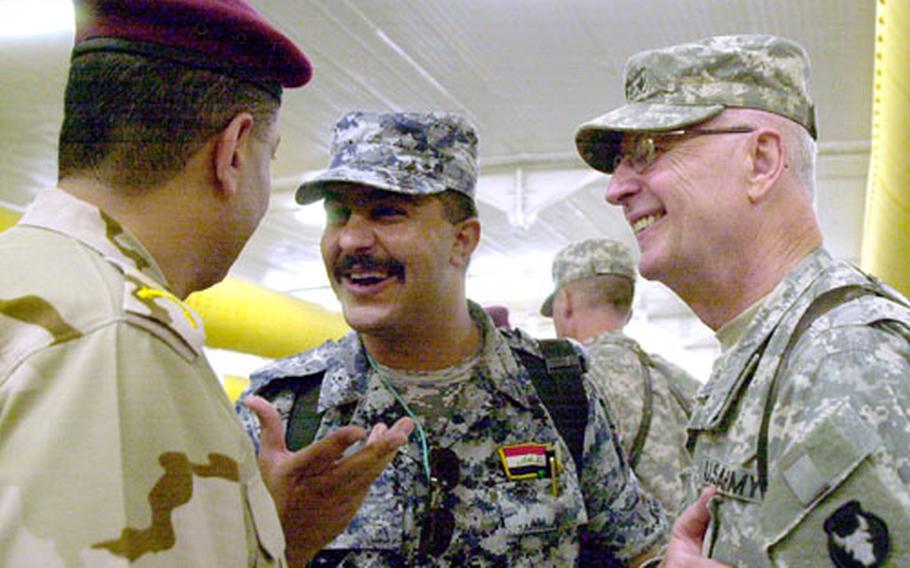
Maj. Gen. Rick C. Nash (right), commander of the 34th Infantry Division, talks with leaders of Iraqi security forces after a transfer of authority ceremony at Contingency Operating Base Basra. Nash now commands Multi-National Division South, which includes the nine southernmost provinces in Iraq and Basra. The area includes the country's most productive oil fields and holiest sites. (Teri Weaver / Stars and Stripes)
CONTINGENCY OPERATING BASE BASRA, Iraq — More than a year ago, militias controlled Basra — its ports, its commerce and its violence.
Then, in March 2008, the Iraqi army swept through the city and drove the Mahdi Army militias from the docks. That calmed the situation for both Iraqi residents and the British troops stationed near the city, one of Iraq’s most populous.
Since then, the Iraqi army has assumed much of the security responsibility in the area, said Brig. Gen. Jerry Lang, deputy commander for the 34th Infantry Division, which took over Multi-National Division-South from the 10th Mountain Division on Wednesday.
Now the goal is to build up municipal and government services for 9.5 million people spread across an area slightly bigger than Georgia.
"We are focusing on building on civil capacity, working on the governance and the rule of law," Lang said during an interview in his office at division headquarters.
The reconstruction refrain is familiar in a country that desperately needs both armed guards and trash service. This time, Lang said, the Iraqis will drive the rebuilding process. In the past, he said, the Americans were so eager to spend money that they approved projects and distributed funds before fully understanding what the local population needed.
"We don’t want to do something just because we think it should be done," Lang said. "And in the past, that, I think, has happened sometimes, that we have gone out and spent valuable taxpayer money on a project that wasn’t necessarily something that the government or the people of Iraq really needed."
Basra and its surrounding provinces need a lot.
The seaports handle 85 percent of the country’s imports and exports, yet the main commercial port at Umm Qasr operates as if it were the late 1960s, a British official said earlier this week. Both the city of Basra and the surrounding agricultural fields lack water treatment and distribution systems. The courts in a nearby province recently had a backlog of 900 pending civil and criminal cases, Lang said.
Violence in the area persists, Lang said, and encounters with roadside bombs and explosively formed penetrators — unusually powerful bombs — have risen slightly in recent weeks. The perpetrators are still militia members, although their numbers are smaller and their arsenal seems much weaker than before the March 2008 sweep.
"Their abilities are certainly degraded," Lang said.
Yet the insurgents remain deadly. An Iraqi police officer was killed Sunday by a roadside bomb, and an Iraqi police general survived an assassination attempt earlier this month. On May 10, U.S. Army Maj. Steven Hutchinson died from wounds suffered in a roadside bomb explosion.
It’s unclear whether the uptick in violence is a sign of more trouble to come or a test for the newly arrived American troops, several Army officers said in recent days.
A few months ago, the British oversaw Basra and its province. The Americans had troops on the ground in eight other southern provinces but ran them from Camp Victory in Baghdad.
About a month ago, the 10th Mountain Division moved down to Basra and took over a newly formed MND-South to combine the nine provinces under one U.S. command.
The 34th Infantry Division took over MND-South on Wednesday. The division oversees 14,000 coalition forces and 4,100 Iraqi army troops. There are also more than 100,000 Iraqi police and an additional 4,500 Iraqis who control the borders, according to 1st Lt. Jeffrey Gruidl, a spokesman for the division.
Lang said their job now is to help southern Iraq improve its services so it can eventually sell its resources to the rest of the world.
Already, some Iraqis are doing just that. Southern Iraq has three commercial airports, some of the country’s richest oil fields and some of Islam’s most cherished religious sites.
Private tour buses take hundreds of visitors from the Iranian border to Karbala and other cities each week. The government has built a business center near the Basra airport, with the hope that international oil companies will rent offices to set up shop and buy into Iraq’s oil trade, Lang said.
But that business center remains up to $3 million shy of completion, Lang said. Before that final investment comes, the city and the area must be a place that can take care of its own citizens.
That’s why he thinks it’s a perfect time for the 34th Infantry Division. The division includes soldiers of the Minnesota National Guard, who have deployed to Iraq before. Last time, the unit spent 22 months away from home, first in training and then in an extended 16-month stay in Iraq before going home in July 2007.
About 1,100 members of the MND-South command are from the Guard, including Lang, who at home is the general manager for a ready-mix concrete company with 350 workers. It was the legal staff from the 34th — which includes a civilian judge, prosecutors and defense attorneys — who cut those 900 court cases by 300 in the past few weeks, Lang said.
"We bring in our civilian skills as well as our military skills," Lang said. "There’s a lot in Iraq that we can do to assist them."